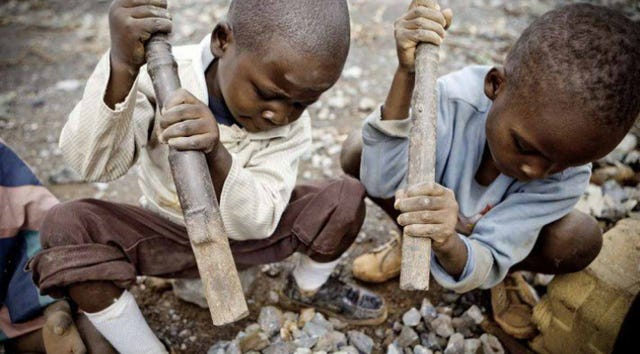Green Deal: Modern Society Changing the Climate
The widespread demonisation of carbon is strange as carbon is literally part of life and nature. Is the climate science one is not allowed to disagree with still science or is it propaganda?

Josep Borrell, European Union's High Representative for Foreign Affairs, has said that Europe's prosperity was built on cheap Russian gas and Chinese labour. The European Commission's Green Deal – an ambitious aim of becoming the first climate-neutral continent - has also been dependent on cheap Russian gas from its very start. Developments of past years have highlighted the weaknesses of this plan, but despite dramatic changes in the geopolitical situation, we see no wish to acknowledge this and the green plan is continued unabated. The plan to renovate housing (yet dreading to call it 'forced') or ban the sale of fossil-fuel cars in the near future are obviously unrealistic and overwhelming tasks (to name but a few), yet they are still presented as essential steps for ‘the common good’. At a time when Ireland is seriously considering the slaughter of 200,000 cows to meet its climate targets, Europe's leading economy, Germany, is vigorously increasing the share of coal in electricity generation. What's so green about it?
The eurozone had built up a huge debt burden of over 90% of GDP even before the green plan, which also needs major investments, was even launched,. At the same time everyone competes to talk of increase in defence spending. How can war and the war industry fit into the same frame with various commitments to combat climate change, the weight of which is being placed on the shoulders of citizens and whose objectives look evidently utopian? This is probably why Bill Gates, a former “health expert” and now “a climate expert” as well, has begun to say the targets set are unachievable and more vigorous geo-engineering of the climate is required. To do this, he wants, among other things, to fly huge balloons into the atmosphere that would spray millions of tonnes of sulphur dioxide to rebound the sunlight. What could possibly go wrong?
The reductionist climate narrative
As with many other matters, there is tunnel vision employed on the climate issues as well, seeing only carbon dioxide as the culprit of the climate change – it is bad, and we need to get rid of it at any cost. The European Commission's climate targets similarly want to reduce its levels in the atmosphere at all costs. The loss of biodiversity, air and water pollution, poverty and all other matters are left beyond the horizon. But such tunnel vision misses the point of ecoprotection: climate change does not equal the planet’s temperature, nature is importantly sustained also by biodiversity, and there must be a balance between these considerations. The widespread demonisation of carbon is all the stranger as carbon is literally part of life and nature. How vegetation, soil and the water cycle help to naturally cool the Earth, how the recycling of materials helps to save the environment and other similar, important topics receive very little attention.

A critically-minded person reading about the various European plans to limit CO2 emissions might have at least a few questions:
What is it all for? If the aim is to control the rise of temperature, as widely claimed, then:
What are the metrics that would allow us to assess the plan’s success in 2030 or 2050?
If all the currently proposed targets are met (all electricity produced from renewable sources, fossil fuel cars banned, etc.), what will be the impact of it on Earth's temperature by 2050?
To do so, is it okay to dig up the earth for mineral resources and continue to clear the rainforests at current pace, hence destroying the balance of nature, water and CO2 cycles?
In his book "Climate – A New Story", Charles Eisenstein describes something called ‘a reductionist climate narrative’. According to that narrative, global warming will cause a flood that will bring about the end of the world. The warming is caused by carbon released into the atmosphere. It is therefore necessary to get rid of carbon. How? By engineering solutions – i.e. repeating the same formula as before, treating problems caused by one machine with the workings of another.
Dependence on mineral resources
The actions accompanying the green agenda, apparently aimed at electrifying the whole industry, have already made us dependent on various mineral resources – copper, cobalt, lithium, nickel, rare earth metals, etc. These, in turn, come largely from countries that cannot usually be described as 'democratic'. If, for example, a similar ESG matrix was applied there that’s in use by numerous Western companies, it would be questionable if anything could be bought from them at all – it would reveal an obvious double standard that is not much talked about. ESG issues are dealt with unevenly even in the Western private sector, and attitudes towards ESG vary considerably from country to country. For example, at the annual shareholders' meeting of one of the world's largest companies, Berkshire Hathaway, in May, all climate and sustainability proposals were overwhelmingly rejected, with investors' returns taking priority. According to the company's legendary chairman Warren Buffett, the company's goal is to use investors' money in the most productive way possible. Buffett said Berkshire's dozens of operating businesses recognize they do not have "a piggy bank to promote their own views on politics," though political contributions at the corporate level "unfortunately are in a few industries part of the way the world works." A similar trend has recently been witnessed in the dealings of many other large-scale US companies.
A large part of the EU and US green turnaround comes from China, as do almost all the components for wind and solar farms, electric car parts and other pieces of electronics. Volkswagen believes that it would be too expensive to produce batteries in Europe. Last year, China started building coal-fired power stations at a rate 6 times higher than the world as a whole – two new plants a week! Hannes Hanso wrote as long ago as in 2008 that triple-digit oil prices will draw up new global power lines and oil and gas dependency would no longer allow the West to pursue a value-driven foreign policy. How have these trends changed by now, 15 years later?

Never before have the resources in question been extracted from the Earth at such volume and pace –and the trend is just gaining momentum. The extraction (leaving aside uncertainty whether we even have enough of them in the ground) is carried out by machines that are still running on diesel. The planned gigafactories will still be built using concrete, steel, plastics, and there is energy required to produce those. In addition, new energy infrastructure will have to be built, which will also require energy. To do this, we need fossil fuels, and their production should therefore even increase in time. Even if all the passenger cars were replaced by electric ones overnight, we would only reduce the use of gasoline, but gasoline accounts for about 40% of one barrel of oil, while the rest of it is diesel, propane and 6,000 other products needed to produce plastics, steel, cement, asphalt and fertilisers, amongst other things.
The correlation between the economy and energy, and energy and materials, is essentially 1:1 – meaning that in order to achieve the desired economic growth, an equal amount of energy is needed. Calls to end fossil fuel extraction ignore the fact that demand for products made from it is likely to grow over time. For example, what are the components of renewable energy equipment, that are critical for the green revolution, made of – batteries, wind turbines, solar panels? Moreover, they are truly renewable only if someone renews them, i.e. replaces them with new ones every 20 years or so. This is why it is also important to understand, in all cost-benefit calculations, how much energy is needed to achieve a certain energetic capacity (e.g. in building a wind farm, renovating it, etc) and where will it come from – in regards to construction, materials, replacement of equipment, etc.
When there is no more growth
Prosperity made a rapid rise in many countries after World War II, when mass propaganda was used to stimulate consumption. People were defined as consumers, and a society that consumed beyond its actual needs as a consumer society. Probably everyone has experienced, or at least noticed, the impulsive, no-need driven purchasing of goods. Social media has brought the problems associated with it even closer, and it is thus quite understandable to hear views that suggest we might need to start shrinking as a human race. This is a broader issue, but if we look at the demographics of the population worldwide, the current practices seem rather self-destructive in the context of an already ageing and shrinking European society and won’t answer the question of who in this shrinking society will be forced to survive without electricity and who without food? For someone will be caught in the gears.
The long-term forward-looking budgets of many countries forecast a stable growth of 2-3%, which would at least cover the existing expenses and pay interest on the loans. But what happens if we replace the expected growth figure in these models with a zero (let alone make the figure negative)? Nothing good is about to ensue of this.

The green turnaround should first of all be viewed from the point of a more resource-efficient economy – and the current plan does not pay enough attention to this. The use of fossil fuels, and many other essential mineral resources, must be used as sustainably and strategically as possible, since we are going to need more of them in the coming decades. However, their scarcity will drive up the prices of essentially all the goods and services. There are certainly benefits to be gained from more conscious behaviour – decades of wasteful use of resource have fuelled a habit of buying things in total ignorance of where they come from or what they are made of, and throwing them away afterwards in equal ignorance of what will happen to them next – it is only the purchase price that is made to matter. In the light of that, a fair price of the materials cannot be comprised of just the price of extraction, plus a margin. However, a fair pricing of the materials seems almost impossible in view of countries being dependent on their economic growth and the competition between them. And if so, there is no such thing as a 'green' car, computer or telephone, not in direct nor indirect sense. Nor could a phone cost only a few hundred euros. Is the modern consumer society ready for this?
"Scientific consensus"
Science is not about what we should do, it just provides us the facts. Science that cannot be questioned, however, is propaganda. And yet we heard expressions like “science is settled” or “science has spoken” aplenty during the Covid years. Regardless of the fact that the one and only accepted 'science' was constantly changing, to the point of laughability by the end of the day, it was still not to be questioned. Anyone who did so was labelled a conspiracy theorist and spreader of misinformation by the new phenomenon of fact-checking. It seems that the same tactics are being tried in the fight against climate change – again, there is ‘a scientific consensus’ which must not be questioned. Or how else should we interpret the words of Melissa Fleming, a UN official, at the World Economic Forum: “We own the science, and we think that the world should know it”. Once again, we see fearmongering raise its head (in the vein of ‘not following the agenda means everyone will die’), which by its very nature makes rational considerations and weighed decisions difficult.

For the most part, the newspaper climate stories have left us with an impression of confused goals and ill-conceived strategies. They also point in the direction of setting limits on individual freedoms, deepening protectionism between different countries and the inevitability of new taxes (the latter witnessed in Estonia straight after the elections). Unfortunately, the messages from Estonian leaders aren’t much clearer than those in the papers: 'Estonia must be the leader of the global green turnaround', and 'green turnaround will not be made at the expense of economy'. And yet, 'the middle class will need adjustments to their budget'. So which is it, will the middle class need to tighten its belt or not? I am reminded of Sir Humpfrey in the TV-series Yes, Minister: “Something must be done. This is something. Therefore we must do this.”
Snowball in hell
What is missing in all of this is a basic definition of what the green revolution is and a concordant operational analysis – in a manner that would be understandable for everyone. The public should be informed in a transparent and consistent way about the measures planned, the speed of their implementation and the direct and indirect effects that they will have. According to the McKinsey study of Europe Net Zero 2050, the plan will cost at least €28 trillion, and in the US reportedly in the order of €50 trillion. However, Europe accounts for about 7% of global anthropogenic CO2 emissions and the US for about 13% – a total of just one fifth of global emissions, both of them on a years-long downward trajectory at that. Complementing the equation with the fact that Europe's population is not only ageing but also shrinking, one will wonder whether the said plan will achieve anything other than a loss of Europe’s competitiveness.
UN estimates the world's population to peak at 11 billion by 2100, after which it is predicted to decline. By the time, Africa is projected to have roughly the same number of people as Asia, and the two will make up 80% of the planet's population. If these regions do not “turn green” at the same pace as us, our efforts to make a credible difference in the world will clearly fall short of the goal. It is also hard to imagine why would a poor region with fast-growing population be willing to voluntarily give up growth. However, European and American growth will be hit much sooner than in 80 years – do we really need to accelerate the process ourselves at all costs?

English anthropologist Gregory Bateson has noted that if man places God outside of nature and then regards himself made in God’s image, it is logical to conclude that he sees himself fundamentally different from the world around him. Thereafter, the relationship with nature deserves no moral or ethical consideration in his mind and the whole environment is there to be exploited. If this is our attitude towards nature, our hope of survival is much like a snowball in hell.
To conclude, nature cannot be measured in money and no one can be scared into caring – be it for people, health or nature. The current green revolution, however, with its 'nudges' that can easily turn into commands over time, seeks to do both. There is hope for us only if we start caring about nature not because it carries financial advantage or profit for us, neither for a fear of an apocalyptic flood, but because we see ourselves as part of nature, and view that kinship as our only natural way to live.





Great article, I was just listening to a Peter Hitchens interview in which he said, along the lines of your concluding comments,
Once you have decided, people are malleable, rather than have been created uniquely by God, then you can seek to change him. The belief that people are not created by God is a licence for a type of politics and type of action that would otherwise be impossible. This belief utopia is possible, people can be changed to suit the kind of society that I want. This is why atheism and Marxist utopianism march hand in hand.
Also made me think of,
“We do not believe any group of men adequate enough or wise enough to operate without scrutiny or without criticism. We know that the only way to avoid error is to detect it, that the only way to detect it is to be free to inquire. We know that in secrecy error undetected will flourish and subvert”. – J Robert Oppenheimer.